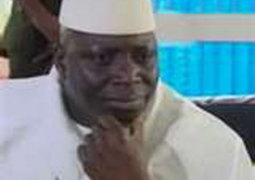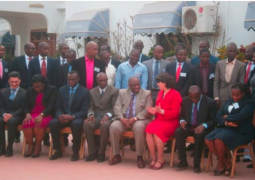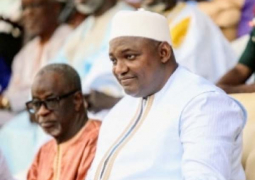Here in Africa, winning a presidential election or being in the ruling party is akin to owning the whole nation, amassing wealth, appointing cronies to key positions and running roughshod over the opposition.
Any suggestion by the opposition is at best seen as subversive, and often the opponents discriminated against when it comes to development.
News that Nigerian politicians have exchanged punches after a splinter group from the governing People’s Democratic Party (PDP) tried to address parliament is indeed shocking, and uncalled for.
The lower house had just reconvened after a seven-week break - during which the new PDP faction was formed.
According to the BBC, MPs loyal to President Goodluck Jonathan began shouting and jeering, which upset their rivals and scuffles broke out.
The new faction, it reports, does not want President Jonathan to seek re-election in 2015.
It is because of some of this political orientation that our societies are bogged down in retrogression.
When you compare the African scenario with what is now happening in other continents, you see a stark difference.
Political opponents no longer see themselves as political opponents, but as one people out there to work for the best interests of their countries and continent.
In Africa, we hardly see such a level of understanding between the ruling party and the opposition.
In Africa, the opposition always cries foul after elections, claiming electoral fraud.
And the president-elect would react likewise, by punishing the opponent and his supporters in every conceivable way.
Instead of availing themselves of the well-meaning advice of the opposition, a ruling party in an African state would rather surround itself with sycophants and selfish supporters, who are only out to enrich themselves at the expense of tax-payers, while those who are principled are sidelined from development undertakings.
Experience has shown that it is the same sycophants who do not hesitate to jump ship, when things turn sour.
African politicians must learn to see their opponents as partners in development, not as enemies. They can do this by working together with their opponents for the good of our societies.
They have to realize too that they are elected to work for the improvement of everybody in society; that they are not in power only to work for the betterment of a section of society.
If an opposition stronghold deserves some infrastructure, it should get it because it is also part and parcel of society.
On the other hand, if a constituency that supports the ruling party deserves development, it should have it based on merit, not on partisan considerations.
When vital national interests are at stake, the opinions and judgments of the opposition should be sought.
And the opposition should also respond in good faith by giving advice that fosters progress in every way.
It is only when African ruling parties and the opposition parties alike put the national interest over and above narrow selfish partisan interests, that Africa will enjoy meaningful sustainable development.
“Politics is for the present, but an equation is for eternity.”
Albert Einstein




